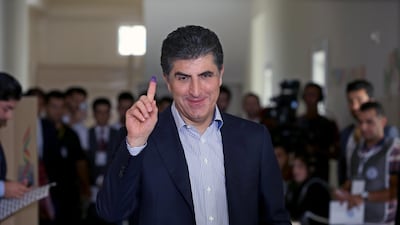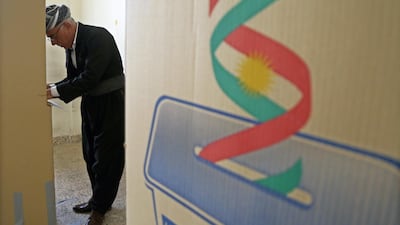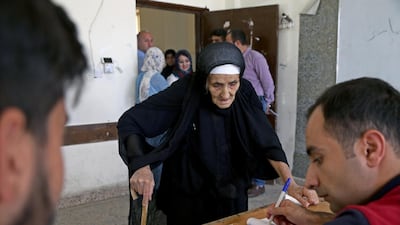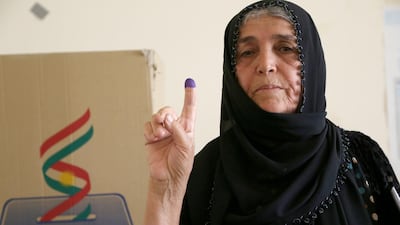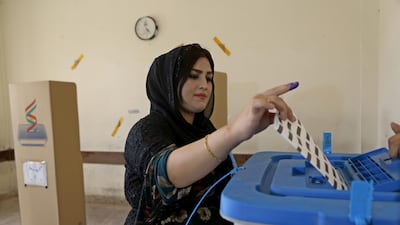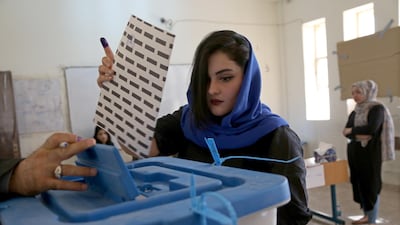Chaos hit Iraq's Kurdistan region on Sunday after a split in one of the dominant political parties on recognising the results of Sunday's parliamentary elections.
The Patriotic Union of Kurdistan (PUK) spokesman Saadi Ahmed Pira announced that the party would reject the results due to alleged voter fraud.
In response, Qubad Talabani, Kurdistan's Deputy Prime Minister and a senior official of the PUK, denounced Mr Pira's statement, saying that "it is soon to accept or reject the results". The PUK election committee said in an official statement that "there has been systematic pressure put on our supporters and election observers...by the KDP" in Erbil and Duhok.
"We have evidence and documented every irregularity done," the election committee said. "We are ready to follow the legal procedure to get results that are fair to our party and reflects the true results of the election process."
The PUK and the Kurdistan Democratic Party (KDP) are expected to extend almost three decades of power sharing.
The semi-autonomous region began voting on Sunday for a new parliament, amid frustration among residents after a failed bid for independence that brought reprisals from Baghdad last year.
More than 700 candidates are competing for 111 seats in parliament.
Eleven of the seats are, however, reserved for religious and ethnic minorities, five for Turkmen candidates, five for Christians and one for the Armenian community.
An estimated three million people are eligible to vote across three provinces in the region, but many are disillusioned after years of debt problems, corruption and cuts to public salaries.
In response to voter irregularities, the Independent High Elections and Referendum Commission's spokesperson Shwan Zirar, told the media there were many cases of fraud that were recorded in Erbil.
The commission will look into voter complains and they'll inquire and will make a statement as soon as the investigations are done, Mr Zirar said.
Jutyar Adil, a member of the Kurdistan Region’s Independent High Electoral and Referendum Commission (IHERC), told local media outlet Rudaw.
"There have been many complaints from different political parties about irregularities," he said. "The political parties have 24 hours to file their complaints to the IHERC. We are expecting large numbers of complaints and we'll consider every single of them."
Results are expected to be announced 72 hours after polls close.
The independence referendum held in September last year has also deepened public despair and exacerbated the divide between Kurdish political parties. The vote, spearheaded by KDP leader Massoud Barzani, was held in defiance of the international community, sparking anger and rejection from Baghdad's central government.
_________
Read more:
Kurdish candidates court Baghdad ahead of presidential vote
Iraqi parliament demands vote recount
Angry Iraqi Kurds file election complaints with Baghdad
_________
The central government imposed economic sanctions on the northern region and sent federal troops to push Kurdish forces out of oil fields vital for the region's economy, shrinking the turnout in recent elections.
Iraq's parliament passed a budget in March that saw Kurdistan's slice of the federal budget drop from 17 per cent to 12.6 per cent.
"This election is an important step for Kurdistan, especially because around one year ago we voted in favour of independence and faced an aggressive response by the Iraqi federal government," Janghis Awakaly, a KDP official, told The National.
"Today's voting will give legitimacy to the new government to negotiate with Baghdad. And we've had a difficult few years as we fought ISIS and had our budget cut, we are in the new stage and need a strong government to deal with this situation," Mr Awakaly said.
The election is an indicator of the level of success and popularity of the opposition parties, Hiwa Afendi, head of Kurdistan's Regional Government's Department of Information and Technology, told The National.
"The results could change the nature of the decade-long partnership between PUK and KDP in governance and affect their unity in Baghdad. So a lot is at stake," Mr Afendi said.
Anti-fraud measures have been put in place but this has caused dissatisfaction among voters. "They are expected to present two Iraqi documents before placing their ballots," Mr Afendi said.
In comparison to last year's succession vote, Kurdish citizens are not as enthusiastic and feel disheartened.
"There is a certain degree of indifference and a sense that the good governance that we are seek is a long way away," Avin Ahmed, a 30 year-old teacher, living in Erbil told The National.
The aftermath of the referendum last year has resulted in disputes and disunity among the Kurdish parties and that also negatively affects the enthusiasm of the general public, Ms Ahmed said.
Voter turnout was noticeably low, especially in the Kurdish capital of Erbil.
Hana Ali, 28, an electrician who did not vote, told The National that the election will make any difference to the economic crisis in the region.
"I didn't go to vote today. The political parties didn't have any clear program in dealing with this issue that young people in Kurdistan face. I want to be able to have a stable job and take care of my family," Mr Ali said.
"There wasn't any political party that I could rely on to provide half of what people suffer from that are unemployment, lack of services and paying the salaries."
Nevertheless, some residence showed optimism for the future. Halima Abdulrahman 49, voted in Sarwaran district, Erbil, told The National that she is proud to be able to vote again.
"I hope everyone in Kurdistan will come out and vote because this is the opportunity to decide who will rule the region for the coming four years," Ms Abdulrahaman said.
Residence voting in Halabja also appeared resigned to the possibility of fraud.
"My mother and I both tried to vote here. But there were two lists. My mother's name was listed on the one outside, but not on the list inside. So she hasn't been able to vote," a Halabja voter told The National.
When asked if it was a fraud-related issue, he said, “I don’t know. There’s always favouritism for certain parties, but if more people vote, fraud will decrease.”
Muthanna Amin, a Kurdish Islamic Union representative in the Iraqi parliament, told The National that each family is assigned an online code online in order to find out where they can vote.
"But then people show up and their names are not at the polling station they were assigned to," Mr Amin said, adding that residents need to be aware of where they can vote.
A delegation from Iraq's High Commission for Human Rights, which is monitoring the vote, reported the presence of the media near polling centres.
But the commission noted that some of the stations were mismanaged, with voters taking photographs of ballot papers and some even armed, Dr Ali Al Bayati, a member of the commission told The National.
"Some of the polling stations lack the presence of international representatives from electoral monitoring organisations," Dr Al Bayati said.
On Friday, Peshmerga and members of other security forces lined up outside polling stations to cast their votes ahead of Sunday's civilian voting.
The last parliamentary elections were in 2013, but the assembly stopped meeting in 2015 due to internal political tensions and the war against ISIS.
Additional reporting by Emily Burlinghaus from Halabja, and Mohammed Rasool in Erbil, Iraq.



